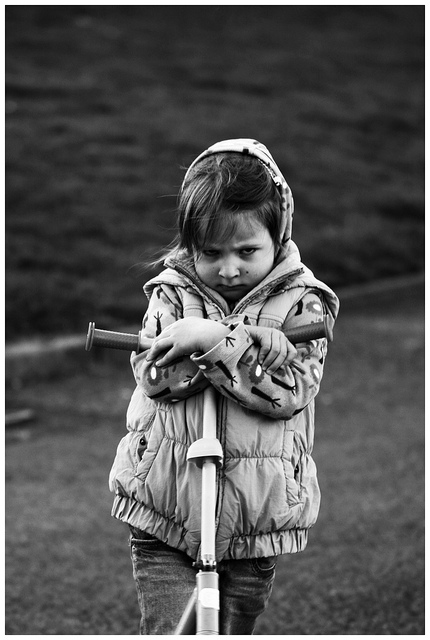“Before you diagnose yourself with depression or low self-esteem, first make sure that you are not, in fact, just surrounded by a**holes.” ~ William Gibson
This quote is a perennial favorite here on elephant journal.
It makes sense. Even the most Spartan soul among us can attest to the fact that the people with whom we surround ourselves can have a significant impact on our physical, mental and emotional health.
Have you ever had a boss who is the human equivalent of Prince Joffrey from Game of Thrones? A friend or acquaintance who could have been a real life incarnation of one of the Mean Girls?
Like every other human being on planet Earth, I’ve experienced my fair share of toxic people. For the sake of brevity, I am focusing on toxic friends. ( I am assuming one has more choice over friends, as opposed to toxic bosses, coworkers, neighbors, family, et cetera.)
What’s the catch? Toxic friends aren’t always easy to spot in the beginning. More often than not, the friendship starts out great!
Toxic friends don’t come with Mr. Yuck stickers. There’s no app for finding them. It’s not like they come with leaflets like medication:
Warning: This medication may cause hives, high blood pressure, shortness of breath, insomnia and migraines. Please contact your doctor if you have an urge to scream lasting longer than four hours.
Toxic people, on the other hand, can often be quite charismatic and intelligent. The toxic friend may have many Facebook friends and Twitter followers and really cool Instagramed yoga photos. Toxic people often occupy positions of prominence in our corporate, academic, political and religious communities.
One thing to note: Nobody is perfect. Toxic people are suffering, too.
And sometimes we all display toxic behaviors. When I’m stressed or sick or scared, I have trouble being my best self, and, for this, I apologize. We all have bad days, where we battle the myriad forces of darkness.
The dirty truth: some friendships—like relationships, or jobs, or hobbies—simply have an expiration date. We change so much throughout our lives. Sometimes it is kinder to let go than hang with folks who would cause us to doubt our worth as a person, make us doubt our abilities, or worse.
Are you treading in toxic friendship waters or simply dealing with a tried-and-true friend who is going through a rough patch and just needs some extra TLC?
1.) There has been a lack of reciprocity for a long time. (“Too busy” should be the dirtiest two words in the English language).
Life can be challenging. I want a crack team in my corner. I want to be there for my friends—but I need to be there for myself, too. If I’m not gonna be there for myself, what kind of message am I communicating to the rest of the world?
It is exhausting to have friends who are always “too busy” to respond to your calls, texts or messages (I’m talking months and years here), who you hear from only when they need a favor—and right that minute: money, a ride somewhere, an introduction to somebody from work or that cute guy who lives in the same apartment building.
Nobody is that busy.
In a healthy friendship, both people’s needs are being met. There is a sense of give-and-take. Each person is willing to arrange his or her schedule within reason to make time for the other. And you want to see each other.
2.) “Hides” behind social media.
Facebook and Twitter do have their place (staying in contact with friends who live far away, for example, or are caretakers for small children or aging relatives or who work difficult schedules), but if you live in the same town as your BFFs, and haven’t seen their pretty faces since 2009, then Houston, you have a problem.
Social media can enable a high level of narcissism among some people. Are you a real friend or just somebody to like posts?
3.) Will drop you like a hot potato whenever a new love interest comes onto the scene.
I want my friends to be in love! While a certain amount of going off the radar is completely normal in a new relationship, the continual Disappearing/Reappearing Friend Cycle gets exhausting!
Does a friend only surface when he or she is single or between relationships—when Mr. or Miss Hot Stuff is at work/Burning Man/out of town/has broken up with them?
4.) Always wants to talk about his/her problems/issues, but treats your concerns like chopped liver.
A good friendship is about give-and-take in terms of emotional support. There are times when one person’s concerns will dominate, but, overall, there is a sense of balance.
Do you listen patiently as your friend discusses her new haircut for two hours and you are allotted three minutes to discuss a loved one’s serious illness before she becomes bored?
“Well, I’m sure it will get better. I have to go now. Did I tell you I lost two pounds?”
You’re not just oversensitive. You are on the Autobahn of going nowhere fast.
5.) Too many backhanded compliments.
Life takes hard work.
And, lo and behold, sometimes that hard work pays off! You get that degree! Or that promotion! Or you finally get that article published! Or run that marathon! Yay for you!
You tell your friend, but he or she downplays your excitement or unleashes (oh no!) a “backhanded compliment.”
Don’t you know you only got that job because you knew somebody? Or a date with Jason because there was nobody better—and you’re really not his type anyway? (He only likes attractive girls?) Ouch. No, super ouch!
Now you’re not only wishing you hadn’t mentioned it, but are beginning to doubt whether you should even feel happy for yourself!
6.) You’re so tired of being “nice” you can feel it in your bones.
Like so many other women of my generation, I’ve been culturally conditioned to be nice, understanding and accepting, especially when the friendship or relationship means a lot to me. I used to accept a lot of toxic behavior in the name of friendship and understanding, and have gotten burned. I’m trying to establish better boundaries.
People-pleasing and playing “nice” is not only dishonest and disingenuous, it can also be dangerous for physical and mental health. Am I always doing favors for, and providing emotional support for people who are unwilling or unable to be there for me in a serious problem or emergency? Why?
My health, happiness and feeling a sense of connectedness are worth more than a truly toxic friendship!
7.) You don’t feel like you can be yourself.
A good friend will, within reason, embrace the unique personality quirks that make you, well, you.
Don’t constantly change yourself to fit in!
If you love Dungeons and Dragons and Barry Manilow you might as well find a way to rock it!
These are just a few things to look out for! And remember: everybody has bad days! Good friends are worth their weight in gold—keep yours close. Have you ever been in a toxic friendship?
Relephant Reads:
4 Signs that a Relationship is Toxic
When Friends aren’t Friends Anymore
Love elephant and want to go steady?
Sign up for our (curated) daily and weekly newsletters!
Editor: Catherine Monkman
Photos: Flickr



Read 4 comments and reply